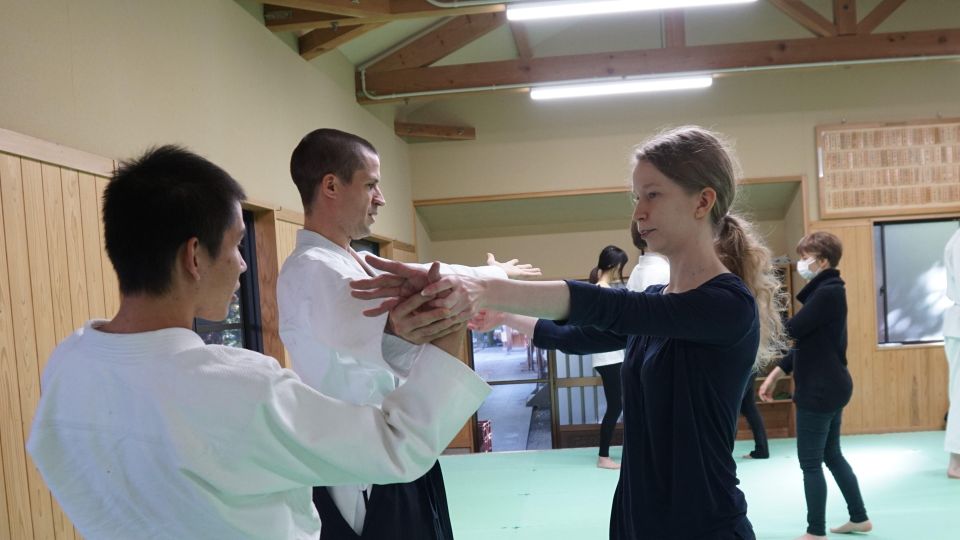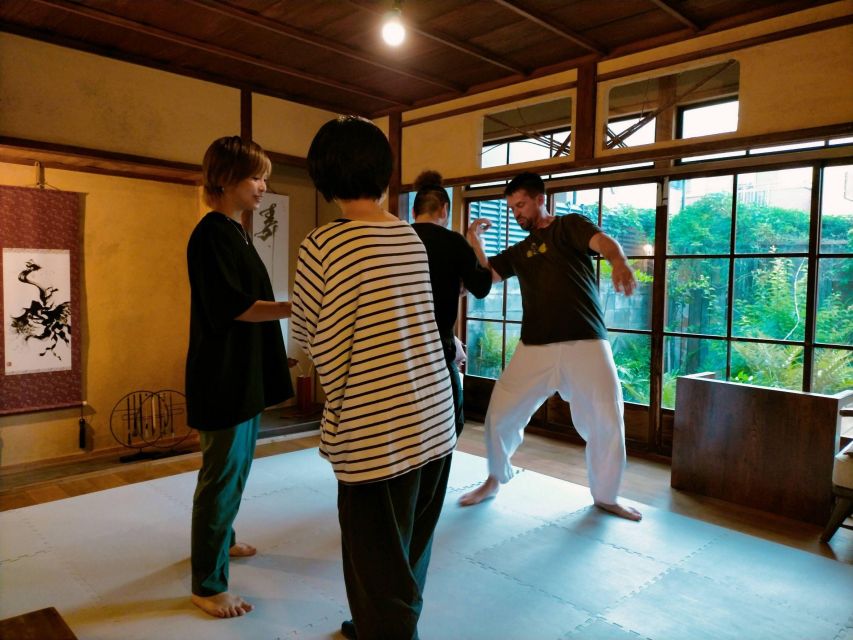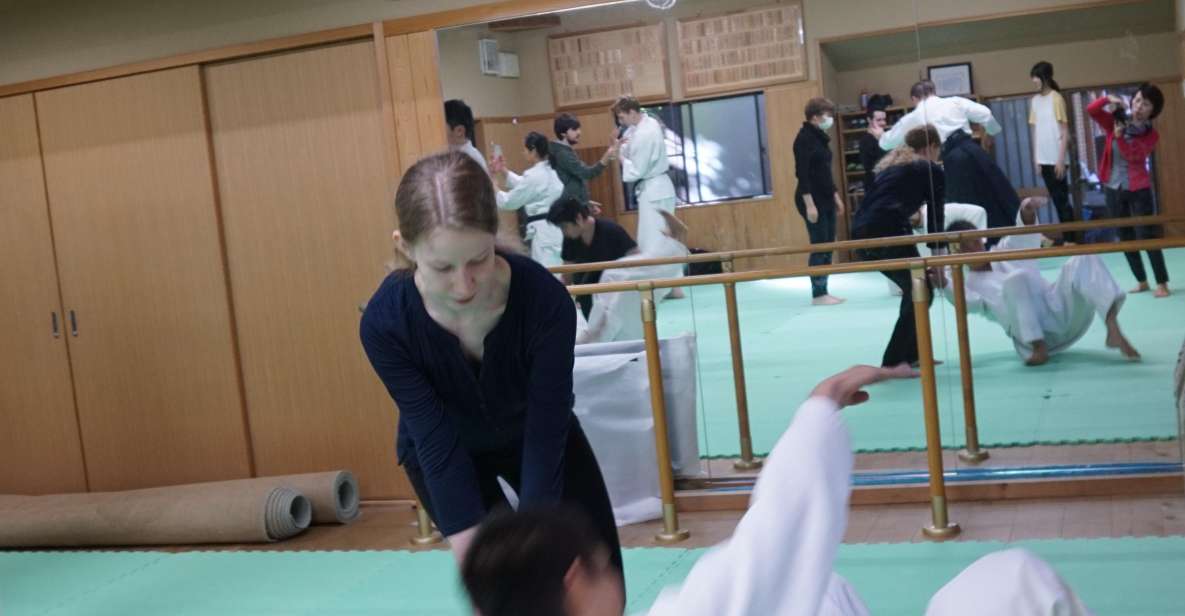Coincidentally stumbled upon by a curious traveler in the heart of Kyoto, the ancient art of Aikido captivates with its graceful yet formidable techniques. As the sun sets over the dojo, the soft sound of feet gliding across the tatami mats fills the air, hinting at the deep wisdom and philosophy embedded within each movement.
The secrets of Aikido unfold, revealing a path that intertwines physical prowess with spiritual growth, offering a holistic approach to self-defense and personal development. Curiosity piqued, a journey into the world of Aikido promises to unravel a tapestry of tradition, discipline, and resilience.
Key Points

- Experience the warrior spirit and learn true Ninja style techniques in a small group setting.
- Gain practical self-defense skills applicable in daily life, taught by expert instructor Andy.
- Enhance strength, stability, and self-defense through Aikido principles suitable for all ages.
- Dive into the history and philosophy of Aikido while enjoying a unique experience in Kyoto.
Origins and History of Aikido
Originally developed by Morihei Ueshiba in the early 20th century, Aikido is a Japanese martial art that emphasizes harmonizing with an opponent’s energy to neutralize attacks and counter with effective techniques.
This martial art has deep Japanese origins, rooted in the ancient fighting techniques of the samurai. Aikido’s history is intertwined with the concept of using an attacker’s energy against them, focusing on blending and redirecting rather than meeting force with force.
Morihei Ueshiba, also known as O-Sensei, combined his martial training with his spiritual and philosophical beliefs to create Aikido, which translates to ‘the way of harmony of the spirit.’ The development of Aikido reflects a rich history of martial arts evolution in Japan, making it a unique and revered practice worldwide.
You can also read our reviews of more tours and experiences in Kyoto.
Principles and Philosophy of Aikido

Morihei Ueshiba’s fusion of martial training with spiritual beliefs resulted in Aikido, a Japanese martial art emphasizing harmony and energy redirection in combat. Aikido’s principles are deeply rooted in its philosophy, which is a blend of physical and spiritual concepts aimed at achieving inner peace and self-improvement.
The philosophy of Aikido isn’t just about self-defense techniques but also about personal growth and understanding one’s connection to the world. The principles of Aikido focus on non-resistance, blending with an opponent’s energy, and redirecting that energy to neutralize attacks peacefully. Through Aikido, practitioners learn to harmonize with the energy around them, promoting a sense of balance and calmness in the face of conflict.
Techniques and Training in Aikido

In Aikido, practitioners engage in a dynamic blend of circular movements and strategic techniques to neutralize attacks and maintain control in combat scenarios. Training in Aikido involves mastering various combat techniques that focus on redirecting an opponent’s energy rather than meeting force with force.
Aikido emphasizes the use of joint locks, throws, and pins to subdue adversaries effectively. Through consistent practice, students develop not only physical conditioning but also mental agility and awareness. Techniques in Aikido are designed to be practical and applicable in self-defense situations, promoting personal growth and confidence.
Plus, the training in Aikido emphasizes the importance of maintaining good posture and balance, which not only enhances strength and stability but also fosters a deeper understanding of the martial art’s principles.
Benefits of Practicing Aikido
Practicing Aikido offers individuals a holistic approach to physical and mental well-being through its unique martial arts techniques. Aikido provides various benefits to its practitioners, including:
-
Improved Focus: Aikido training requires concentration and mindfulness, helping individuals enhance their focus both on and off the mat.
-
Stress Relief: By focusing on breathing techniques and controlled movements, Aikido can serve as a form of stress relief, promoting relaxation and mental well-being.
-
Increased Flexibility: Aikido techniques involve fluid motions and stretches, aiding in improving flexibility and overall physical health.
Engaging in Aikido not only enhances one’s physical strength and self-defense skills but also contributes to mental clarity and emotional balance.
Aikido in Modern Context
How does Aikido adapt to the demands of modern society while preserving its traditional values and techniques? Aikido has evolved to have modern applications while staying true to its cultural significance. In contemporary settings, Aikido is not just about self-defense but also about personal growth, conflict resolution, and mindfulness. The practice emphasizes harmonizing with an opponent’s energy rather than meeting force with force. This philosophy is valuable in today’s world, promoting non-violent resolutions and inner peace. Below is a table showcasing the blend of traditional and modern aspects of Aikido:
| Traditional Aspects | Modern Applications |
|---|---|
| Focus on harmony and respect | Utilizing Aikido principles in conflict resolution |
| Emphasis on circular movements | Applying Aikido techniques in self-improvement and mindfulness |
| Connection to Japanese culture and history | Incorporating Aikido into diverse cultural contexts |
Experiencing Aikido in Kyoto
Experiencing Aikido in Kyoto immerses participants in a blend of traditional martial art techniques and cultural richness, offering a unique and enlightening journey into the world of this Japanese practice.
The experience in Kyoto combines culture and physical activity, providing a holistic understanding of Aikido. Participants engage in martial arts training, promoting mindfulness and discipline.
The serene surroundings of Kyoto enhance the practice, allowing individuals to connect with the martial art’s essence deeply.
The experience goes beyond physical movements, delving into the philosophical aspects of Aikido, fostering personal growth and self-awareness.
Common questions
How Does Aikido Differ From Other Martial Arts Such as Karate or Judo?
Aikido, unlike karate or judo, focuses on redirecting an opponent’s energy rather than meeting force with force. Its combat techniques emphasize blending and harmony, making it unique in promoting self-defense skills through fluid movements and minimal resistance.
Are There Any Specific Clothing or Equipment Requirements for Participating in an Aikido Workshop?
The dress code for the workshop is flexible, allowing comfortable attire for free movement. No specific equipment is needed; accommodations are made for all participants. Enjoy the experience without worry about special gear requirements.
Can Aikido Be Practiced by Individuals With Physical Limitations or Disabilities?
Aikido can be practiced by individuals with physical limitations or disabilities through adaptive techniques and inclusive practices. Expert instructors tailor techniques to accommodate varying abilities, emphasizing posture, balance, and mindful movements for all participants.
Is There a Specific Etiquette or Code of Conduct to Follow During Aikido Training Sessions?
In Aikido training sessions, participants adhere to specific training etiquette and conduct. They show respect for their instructor, fellow practitioners, and the art itself. Techniques are practiced with focus, discipline, and a deep sense of mutual respect.
Are There Any Cultural or Spiritual Aspects of Aikido That Participants Should Be Aware of Before Attending a Workshop?
Participants in Aikido workshops should be aware of the rich cultural and spiritual aspects embedded in the art. Understanding these elements enhances the experience, fostering respect, mindfulness, and a deeper connection to the tradition.
Final Words
To sum it up, Aikido isn’t just a martial art, but a way of life that promotes harmony, self-improvement, and inner strength.
By practicing Aikido, you can develop physical skills, mental discipline, and a deeper understanding of themselves and others.
The rich history and philosophy of Aikido, combined with practical self-defense techniques, make it a truly unique and transformative experience for all who embark on this journey.
Experience the essence of Aikido in Kyoto and discover the warrior spirit within you.
More Tour Reviews in Kyoto
Not for you? Here's more nearby things to do in Kyoto we have reviewed
- Kyoto: Early Morning Tour With English-Speaking Guide
- Kyoto: Private Photoshoot in Arashiyama, Bamboo Forest
- Arashiyama Kyoto: Bamboo Forest, Monkey Park & Secrets
- SnapKyoto Photoshoots & Tours
- Kyoto: Geisha District Guided Walking Tour at Night
- Kyoto: Table-Style Tea Ceremony and Machiya Townhouse Tour
- Kyoto Zen Meditation & Garden Tour at a Zen Temple W/ Lunch
- Samurai Kimono Rental for 1 Day (Until 17:30)
- Kyoto/Osaka: Sanzenin, Bamboo Forest, & Arashiyama Day Trip
- Kyoto: 10-hour Customized Private Tour
- Kyoto: Luxury Sake, Whiskey, and Cocktail Tour
- Kansai Airport (Kix): Private One-Way Transfer To/From Kyoto
